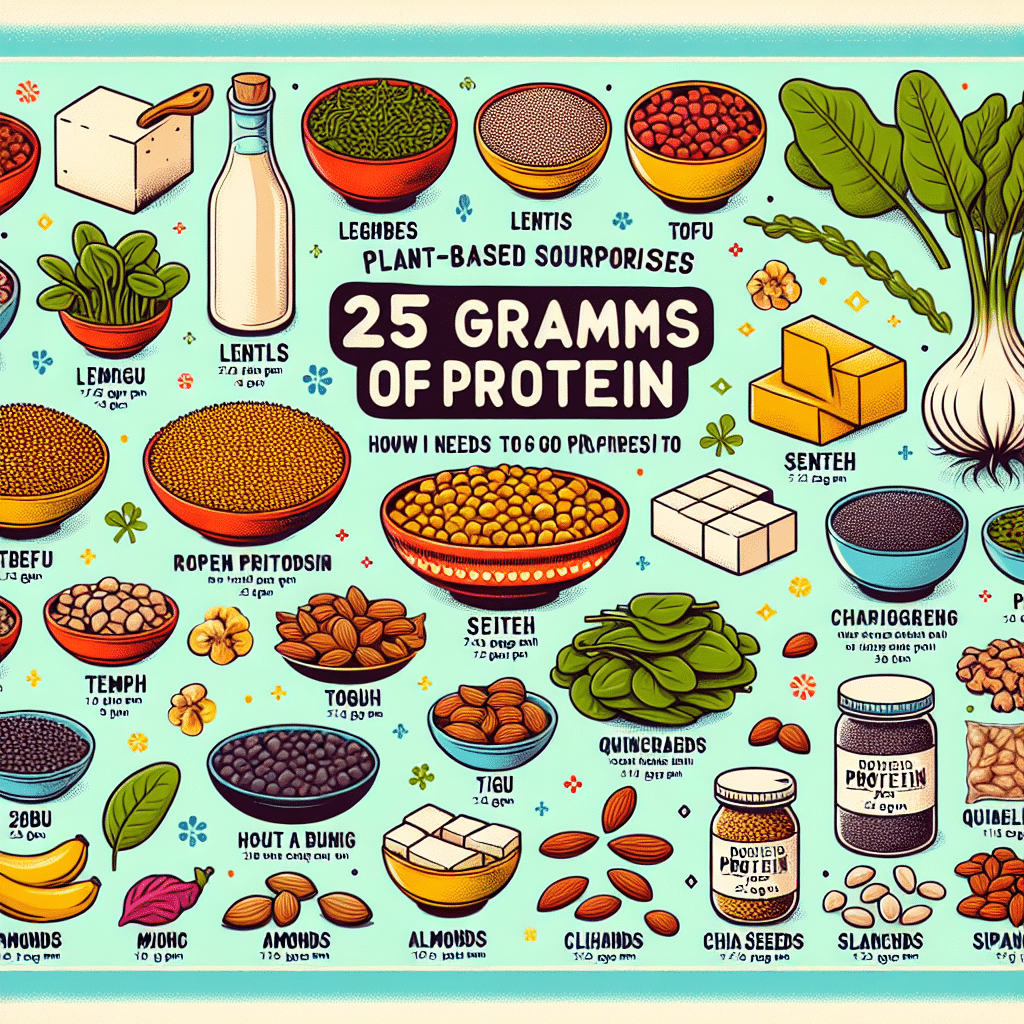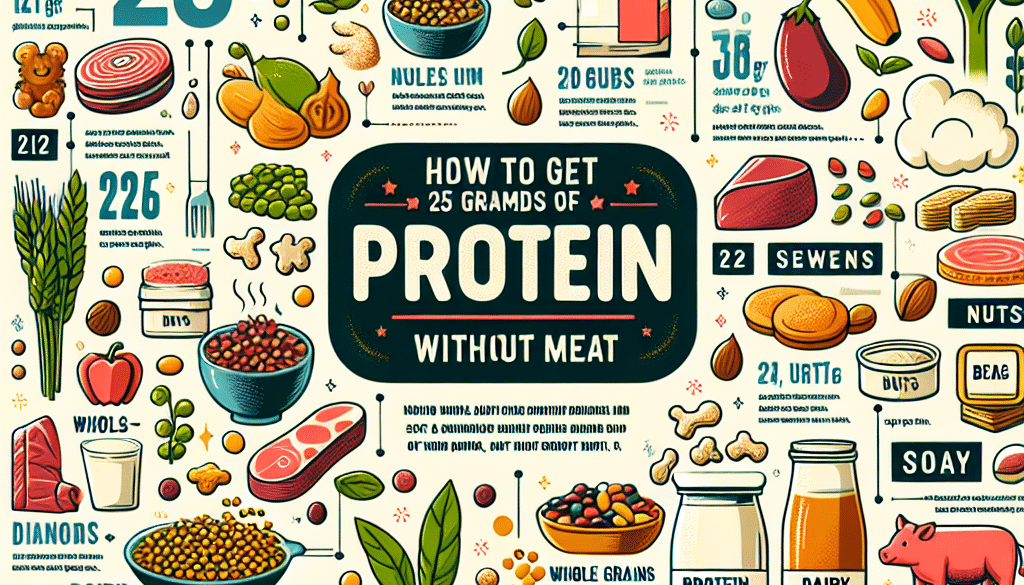How To Get 25 Grams Of Protein Without Meat?
-
Table of Contents
- 25 Grams of Protein Without Meat: A Comprehensive Guide
- Understanding Protein Requirements
- Plant-Based Proteins: A Viable Alternative
- Dairy and Egg Proteins: High-Quality Options
- Protein Powders: A Convenient Boost
- Combining Sources for Complete Proteins
- Sample Meal Ideas
- Conclusion: Diverse Protein Sources for a Balanced Diet
- ETprotein: Your Partner in Plant-Based Protein
25 Grams of Protein Without Meat: A Comprehensive Guide

Protein is a crucial macronutrient that plays a vital role in building and repairing tissues, making enzymes and hormones, and providing energy. Traditionally, meat has been the go-to source for protein, but with growing health, environmental, and ethical concerns, many people are seeking alternative sources. This article explores how to get 25 grams of protein without relying on meat, offering a variety of options for vegetarians, vegans, and those looking to diversify their protein intake.
Understanding Protein Requirements
Before diving into meatless protein sources, it’s important to understand how much protein you need. The Recommended Dietary Allowance (RDA) for protein is 0.8 grams per kilogram of body weight per day for adults. However, individual needs may vary based on factors such as age, sex, activity level, and overall health. For someone aiming to consume 25 grams of protein in a meal or throughout the day without meat, there are plenty of plant-based and dairy options available.
Plant-Based Proteins: A Viable Alternative
Plant-based proteins are not only sustainable but also offer a range of health benefits. They are typically lower in calories and fat than meat and provide fiber and other essential nutrients. Here are some top plant-based sources that can help you reach the 25-gram protein mark:
- Lentils: One cup of cooked lentils packs about 18 grams of protein, along with fiber, iron, and potassium.
- Chickpeas: With roughly 15 grams of protein per cup, chickpeas are versatile and can be used in salads, soups, or as a base for hummus.
- Black Beans: A cup of black beans contains about 15 grams of protein and is also rich in antioxidants and fiber.
- Quinoa: This pseudo-cereal offers 8 grams of protein per cup cooked, making it a great addition to salads or as a side dish.
- Tofu: A 4-ounce serving of tofu provides about 9 grams of protein. It’s a great meat substitute that can be grilled, baked, or stir-fried.
- Tempeh: Made from fermented soybeans, a 3-ounce serving of tempeh contains around 16 grams of protein.
- Edamame: These young soybeans offer 17 grams of protein per cup and are a tasty snack or addition to meals.
- Nuts and Seeds: Almonds, chia seeds, flaxseeds, and hemp seeds are protein-rich options that can be added to smoothies, oatmeal, or yogurt.
Dairy and Egg Proteins: High-Quality Options
For those who are not vegan, dairy products and eggs are excellent sources of high-quality protein:
- Greek Yogurt: A 7-ounce serving of Greek yogurt can contain up to 20 grams of protein, along with probiotics for gut health.
- Cottage Cheese: Half a cup of cottage cheese provides about 14 grams of protein and can be enjoyed as a snack or mixed into dishes.
- Eggs: One large egg has about 6 grams of protein. Two eggs can easily fit into a meal, bringing you closer to the 25-gram goal.
Protein Powders: A Convenient Boost
Protein powders are a convenient way to increase your protein intake, especially for those with busy lifestyles:
- Pea Protein: Derived from yellow split peas, this powder can offer around 21 grams of protein per scoop.
- Rice Protein: A scoop of rice protein powder typically contains about 12 grams of protein and is hypoallergenic.
- Hemp Protein: Hemp protein powder provides about 15 grams of protein per serving, along with omega-3 fatty acids.
Combining Sources for Complete Proteins
While many plant-based proteins are not ‘complete’ on their own (meaning they don’t contain all nine essential amino acids), combining different sources can ensure you get a full spectrum of amino acids. For example, rice and beans eaten together form a complete protein. Similarly, hummus paired with whole wheat bread is another combination that provides all the essential amino acids.
Sample Meal Ideas
Here are some meal ideas that can help you reach 25 grams of protein without meat:
- Breakfast: A smoothie with Greek yogurt, hemp seeds, and a scoop of pea protein powder.
- Lunch: A quinoa salad with black beans, avocado, and sunflower seeds.
- Dinner: Stir-fried tofu with broccoli, bell peppers, and cashews served over brown rice.
- Snacks: Cottage cheese with almonds, or edamame sprinkled with sea salt.
Conclusion: Diverse Protein Sources for a Balanced Diet
Getting 25 grams of protein without meat is not only possible but can also be delicious and nutritious. By incorporating a variety of plant-based proteins, dairy products, and protein powders into your diet, you can meet your protein needs while enjoying the health benefits associated with a diverse range of foods. Remember to combine different sources to ensure you’re getting all essential amino acids and to keep your meals interesting and flavorful.
ETprotein: Your Partner in Plant-Based Protein
If you’re looking for high-quality plant-based protein powders to supplement your diet, ETprotein offers a range of products that can help you achieve your protein goals. Their organic rice protein, pea protein, and other seed-based proteins are non-GMO, allergen-free, and characterized by a neutral taste, making them an excellent addition to any meal or snack.
ETprotein’s commitment to purity and quality ensures that you’re getting the best possible product to support your health and wellness journey. Whether you’re a distributor, trader, or manufacturer, ETprotein can provide the protein solutions you need for your business or personal use.
About ETprotein:
ETprotein, a reputable protein and L-(+)-Ergothioneine (EGT) Chinese factory manufacturer and supplier, is renowned for producing, stocking, exporting, and delivering the highest quality organic bulk vegan proteins and L-(+)-Ergothioneine. They include Organic rice protein, clear rice protein, pea protein, clear pea protein, watermelon seed protein, pumpkin seed protein, sunflower seed protein, mung bean protein, peanut protein, and L-(+)-Ergothioneine EGT Pharmaceutical grade, L-(+)-Ergothioneine EGT food grade, L-(+)-Ergothioneine EGT cosmetic grade, L-(+)-Ergothioneine EGT reference grade and L-(+)-Ergothioneine EGT standard. Their offerings, characterized by a neutral taste, non-GMO, allergen-free attributes, with L-(+)-Ergothioneine purity over 98%, 99%, cater to a diverse range of industries. They serve nutraceutical, pharmaceutical, cosmeceutical, veterinary, as well as food and beverage finished product distributors, traders, and manufacturers across Europe, USA, Canada, Australia, Thailand, Japan, Korea, Brazil, and Chile, among others.
ETprotein specialization includes exporting and delivering tailor-made protein powder and finished nutritional supplements. Their extensive product range covers sectors like Food and Beverage, Sports Nutrition, Weight Management, Dietary Supplements, Health and Wellness Products, and Infant Formula, ensuring comprehensive solutions to meet all your protein needs.
As a trusted company by leading global food and beverage brands and Fortune 500 companies, ETprotein reinforces China’s reputation in the global arena. For more information or to sample their products, please contact them and email sales(at)ETprotein.com today.














